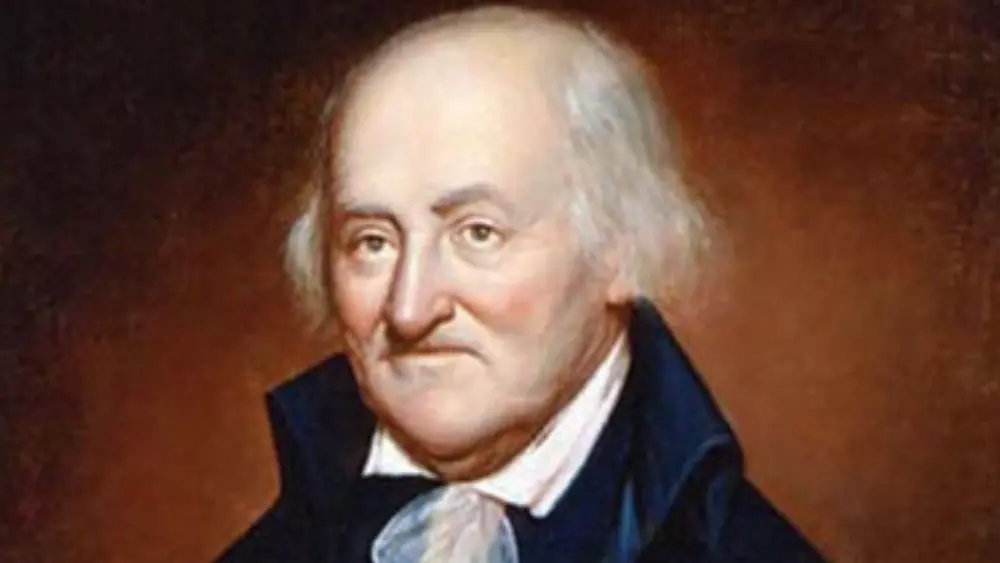Christopher Gadsden, born on February 16, 1724, in Charleston, South Carolina, was a prominent figure in the American colonial era who played a crucial role in advocating for American independence from British rule. His tireless efforts, unwavering commitment to the cause of liberty, and contributions to the founding of the United States mark him as a significant patriot in American history.
Early Life and Business Ventures
Christopher Gadsden enjoyed a privileged upbringing in wealthy South Carolina. His education matched his status, enhancing his intellect and laying a strong foundation for future pursuits. Gadsden naturally ventured into trade and commerce, pursuing diverse entrepreneurial opportunities throughout his career. His keen business sense boosted his wealth and earned him respect in the economic landscape of his era.
However, Gadsden’s life was not solely defined by his business pursuits. His success in the commercial arena afforded him the means to commit himself to political and patriotic causes. Wealth and commitment intersected, enabling a significant political role and contributing time and resources to advance liberty and independence ideals. Gadsden’s journey, shaped by privilege and unwavering dedication, played a pivotal role in shaping American history.
Christopher Gadsden: Resistance to British Taxes
Christopher Gadsden, key in American resistance against British taxes in the 1760s-70s, was pivotal in the colonies’ unruly years. Gadsden strongly opposed British taxes like the Stamp Act and Townshend Acts, emerging as a colonial rights advocate amid rising tensions. His influence and articulate writings became instrumental in galvanizing the colonists to stand up against the encroaching British authority.
Gadsden’s contributions to the colonial cause extended beyond mere rhetoric. He utilized his influential pen to craft articles and pamphlets that eloquently articulated the grievances of the American colonists. Through his writings, he rallied support for the resistance movement and helped foster a sense of unity among the colonists. Gadsden’s fervent defense of colonial rights, condemning unjust British taxation and liberty infringements, resonated widely. Through his writings and advocacy, he inspired many to join the resistance, setting the stage for the American Revolution. Christopher Gadsden’s dedication to colonial freedom had a lasting impact on America’s destiny during this pivotal period.
Resistance to British Taxes
During the 1760s and 1770s, amid rising tensions, a notable figure opposed British taxation policies in the American colonies. Christopher Gadsden vehemently opposed colonial taxes like the Stamp Act and Townshend Acts, playing a crucial role in the rebellion. He used his political influence and writing talent to passionately advocate for colonial rights through articles and pamphlets.
Gadsden’s unwavering dedication to the cause of colonial rights was evident. His writings passionately voiced American colonists’ grievances, rallying support for resistance and fostering unity among them. His eloquent protests against British taxation and colonial oppression ignited wider resistance, fueling the American Revolution’s pivotal events. Christopher Gadsden’s pivotal role during a critical historical juncture left an enduring legacy in the fight for American independence.
Christopher Gadsden: Role in the Stamp Act Congress
In 1765, Christopher Gadsden was a pivotal delegate from South Carolina to the Stamp Act Congress. Colonial representatives united against the oppressive Stamp Act in a momentous congress gathering spanning the American colonies. Gadsden’s role in the event demonstrated his dedication to colonial unity and resistance against British oppression.
The Stamp Act Congress served as a crucial turning point in colonial relations with Britain. It showcased the colonies’ unity against perceived injustices and set the stage for future collective resistance to British tyranny. Gadsden’s active role in Congress solidified his reputation as a dedicated advocate for colonial rights, strengthening the cause. His pivotal role demonstrated colonial resistance’s momentum, marking a crucial step toward the quest for American independence.
Liberty Tree and Flag
Gadsden’s lasting legacy includes creating the iconic “Don’t Tread on Me” flag, symbolizing American determination and resistance. This flag, prominently featuring a coiled rattlesnake, came to embody the spirit of the American Revolution. Gadsden’s design symbolized colonists’ steadfast resolve to defend their rights and liberties from British oppression. The rattlesnake, symbolizing self-defense, embodied colonists’ determination against tyranny.
In addition to the flag, Gadsden’s contributions to the cause of American independence also extended to the establishment of the “Liberty Tree” in Charleston. This gathering place became a symbol of unity and defiance against British rule, where patriots congregated to discuss and plan their resistance efforts. The Liberty Tree and the “Don’t Tread on Me” flag both hold a cherished place in American history, serving as enduring symbols of the relentless pursuit of liberty and the resilience of those who fought for it during the unruly era of the American Revolution.
Christopher Gadsden: Leadership in the Revolutionary War
As the American Revolution erupted onto the stage of history, Christopher Gadsden’s leadership and commitment to the revolutionary cause were exemplified when he was appointed as a brigadier general in the South Carolina Militia. In this critical role, he undertook the formidable responsibility of organizing and leading colonial forces in the struggle for independence. Gadsden’s military leadership would prove crucial in the defense of Charleston, a strategic city in the Southern theater of the war, where his tenacity and strategic acumen would be put to the test.
General Gadsden’s contributions to the Revolutionary War extended beyond the city’s defense. He actively participated in the early battles of the Southern Campaign, a pivotal theater of operations in the conflict. His presence on the battlefield not only bolstered the morale of American forces but also helped shape the military strategies that would ultimately lead to victory against the British. Gadsden’s leadership during these hard times exemplified his unwavering dedication to the cause of American independence, leaving a lasting impact on the history of the American Revolution.

Legacy
Christopher Gadsden’s enduring legacy as a passionate advocate for American independence and a stalwart defender of colonial rights is deeply ingrained in the fabric of the nation’s history. Gadsden’s contributions serve as a testament to the resilience and determination of early American patriots who risked everything for the cause of self-determination and individual liberties.
The iconic “Gadsden Flag,” featuring a coiled rattlesnake and the stirring motto “Don’t Tread on Me,” remains an enduring symbol of American independence and the steadfast pursuit of individual rights. This flag, created by Gadsden, has transcended its origins and been adopted by various groups and movements throughout American history, symbolizing the enduring spirit of resistance against oppression and tyranny.











